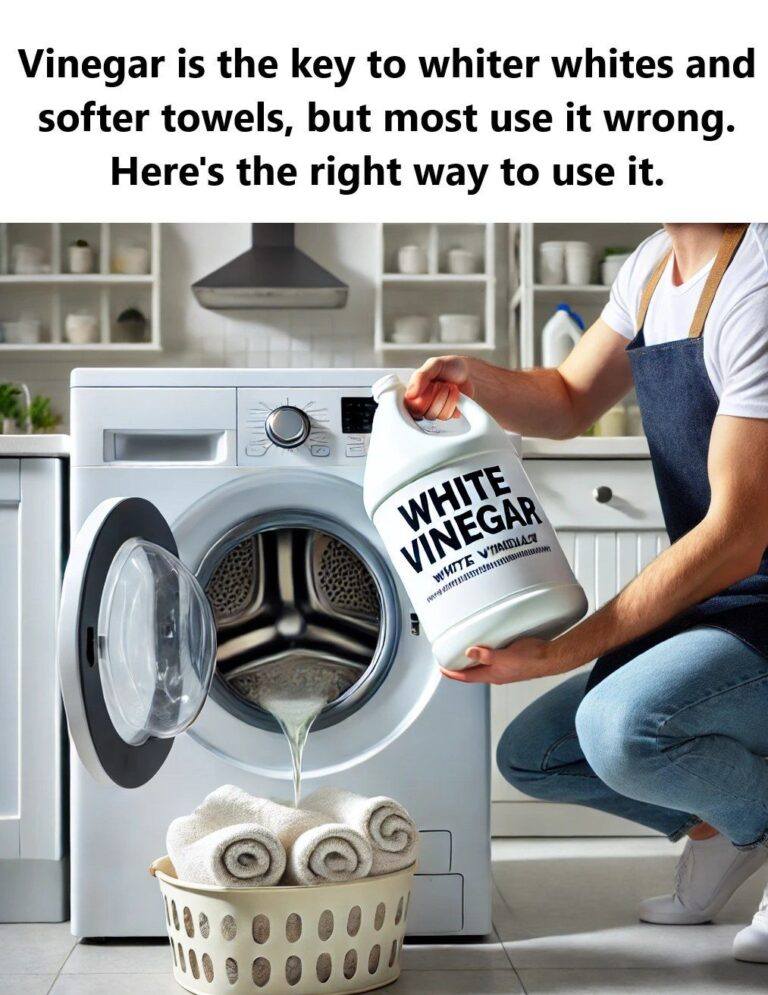Vinegar is more than just a kitchen staple—it’s one of the most underrated yet powerful tools you can use in your laundry routine, offering a natural, affordable, and highly effective way to improve the look, feel, and smell of your clothes. If you’ve ever been frustrated by whites that look dull, towels that feel stiff, or clothes that carry unpleasant odors even after being washed, vinegar may be the solution you’ve been missing.

Despite its many benefits, most people don’t use vinegar properly in their laundry, which means they miss out on all it has to offer. When used the right way, vinegar can act as a natural fabric softener, whitening agent, odor neutralizer, and even a remedy for hard water buildup, all without the use of harsh or synthetic chemicals. The key lies in understanding how vinegar works and how to use it correctly in each stage of your laundry process. One of vinegar’s best-known benefits in laundry is its ability to soften fabrics by dissolving detergent residue that often builds up over time and makes clothes feel rough. Simply add half a cup to a full cup of white distilled vinegar to the fabric softener compartment of your washing machine to allow it to be released during the rinse cycle. The vinegar will leave your towels and clothes soft and fresh without the need for artificial scents or commercial softeners.
Concerned about the smell? Don’t worry—the scent of vinegar fades completely once the clothes are dry. Another amazing benefit of vinegar is its whitening power. The acetic acid in vinegar helps break down the buildup of soap scum, detergent, and minerals that can cause whites to look yellowed or gray. Adding one cup of vinegar during the rinse cycle can help brighten whites like towels, bed linens, and t-shirts. For stubborn stains, make a paste of vinegar and baking soda, apply it to the affected area, let it sit for several minutes, and then wash as usual for an added boost in stain removal. When it comes to odors, vinegar is incredibly effective. Clothes that trap body odor, mildew, or musty smells—such as gym clothes, towels, and pet bedding—can be refreshed by adding a cup of vinegar to the wash.
For fabrics with especially strong smells, pre-soak them in a solution of vinegar and water for about 30 minutes before washing. Vinegar helps break down odor-causing molecules, leaving your laundry smelling clean and neutral without the overpowering perfumes of chemical-based detergents. Vinegar is also useful for reducing lint and preventing static cling. Add half a cup to the rinse cycle to help reduce lint buildup and make your clothes more comfortable to wear. This is particularly helpful when washing towels, sweaters, or synthetic fabrics. If you live in an area with hard water, you’re likely familiar with the issues it causes—such as residue on your clothes that can make them feel coarse or appear faded.
Vinegar works to break down these mineral deposits, improving the softness and brightness of your laundry. To combat hard water issues, add a cup of vinegar to your wash cycle regularly. You can even use vinegar in the dryer for added benefits. To reduce wrinkles and enhance softness, apply a small amount of vinegar to a clean cloth or dryer ball and toss it in with your clothes. It will help remove any remaining detergent residue and soften fabrics further. However, as effective as vinegar is, there are important guidelines to follow. Never mix vinegar with bleach, as it creates dangerous fumes. Avoid overusing vinegar; stick to about one cup per load to prevent an overly acidic smell. Lastly, while vinegar is safe for most materials, avoid using it on delicate fabrics like silk or wool—always check the care label first. In conclusion, vinegar is a simple yet powerful laundry enhancer that can replace multiple commercial products. It softens fabrics, brightens whites, eliminates odors, reduces static, and fights hard water buildup, all while being safe for the environment and your family. By using vinegar correctly and consistently, you can transform your laundry routine naturally and effectively. So next time you load the washer, consider skipping the artificial fabric softeners and reach for the vinegar—your clothes, towels, and linens will feel better, look better, and smell better too.





